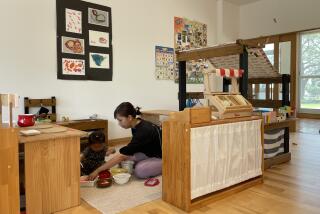Have a Baby, Get a Bonus
- Share via
LAVIANO, Italy — Angelina Spiotta had always wanted to be a mother. Married a year, she figured it was time. It didn’t hurt that her local government was offering parents nearly $14,000 for every baby delivered in this struggling southern town.
Spiotta gave birth to little Massimo late last fall, “not because of the money,” she said, “but the money is a help. It helps for the future.”
Across Italy, towns are dying, and like the canary in the coal mine, these small deaths are a sign of what could happen to the country as a whole if its birthrate doesn’t climb. As it stands, Italy’s population could shrink by a third by 2050; until now, only an influx of immigrants has kept the numbers stable.
The stereotype of the large Italian family in this heavily Roman Catholic country is a thing of the past. For nearly a decade, Italy has had one of the lowest birthrates in the world. Many Italian women, citing primarily economic reasons, forgo bearing offspring altogether or, at most, have just one child.
So the town of Laviano is looking for bambini.
Authorities are offering women money to give birth, part of a campaign to maintain the population and attract newcomers.
“I know someone doesn’t have a baby just because of the money,” Mayor Rocco Falivena said. “But maybe this will keep some people from leaving, or make them think twice about leaving. We thought we could sound an alarm. Do something provocative.”
The money is given to parents over the first five years of the child’s life. About 20 couples have availed themselves of the bonus since Falivena introduced the idea in 2003.
When he became mayor the year before, he assumed leadership of a dispirited burg. Since an earthquake nearly destroyed Laviano in 1980, the town’s population had dropped by half, to about 1,500. Only four babies were born in 2000, followed by the same number in 2001.
“I realized it was the end of the village,” Falivena said.
It’s too soon, and the numbers are too small, to speak of trends. But Falivena, 52, likes what he is seeing: Eleven babies were born last year, and residents said they knew of a handful of people who had moved to Laviano from neighboring towns to take advantage of the payout.
Experts are less encouraging. The few studies available indicate that a cash incentive might encourage a woman to have a baby earlier than she had planned but won’t encourage her to have more children than she otherwise would have.
Nor is someone who is dead-set against having children likely to change her mind because of a bonus.
Falivena is the first to admit that it will take much more to reverse his town’s fortunes. Foremost is employment. Residents need a way to make a living. But that, he says, is the vicious circle: Without people, the economy cannot be stimulated to provide the jobs to keep the people.
“We have no people,” he said in an interview at Laviano’s salmon-colored town hall. “You can’t plan activities. You can’t create industry or jobs. We have no strength to get back on our feet. If you want to open a shoe store, there is no one to buy shoes.”
Laviano, which sits in the Apennine Mountains 35 miles east of Salerno, has the feel of a ghost town. On a recent winter day, the sky was bright, the air crisp, and there was barely a soul in sight. It was almost silent, except for birds and an occasional passing car.
Nearly half the town’s housing, most of it sterile, nondescript post-earthquake construction, sits empty. The only movie theater has closed. The center consists of a town hall, a church and a tangle of squat buildings that cascade downhill.
The only school has an average of fewer than 20 children in each of its eight grades; the nearest high school is 20 miles away. The town’s most prominent feature, on a ridge overlooking the center, is the overcrowded cemetery, where 300 people who were killed in the earthquake are buried.
Spiotta, the mother of little Massimo, agreed with the mayor. Although the baby bonus will help ensure her son’s education, she said, the real incentive to stay in Laviano is a good job for her husband. Right now, he does dead-end labor in a plastics factory a 45-minute drive away.
“If there is work, we would like to live here forever,” said Spiotta, 24, who worked picking strawberries until her pregnancy. She spoke in her small, immaculate living room, full of new furniture and a large, late-model television on which a soap opera was showing.
Spiotta’s parents were participants in a vast wave of immigration in the 1960s and ‘70s, when Italians fled from the country’s south to Germany, Switzerland and other more prosperous nations.
Spiotta was born in Germany and returned to Laviano with her family when she was 6.
Antonietta Molinaro tells a similar story. She was born to parents who immigrated to Germany in search of work and returned to Italy when she was small. For her, the baby bonus was a godsend: She had twins nearly a year ago -- double the money.
She, too, says the stipend helps but that the real determining factor for staying or going is employment.
Her husband has occasional work as a welder, and she sews. In the meantime, Molinaro says Laviano is a great place to raise kids.
“It is very quiet and peaceful. Especially for the children, it is very safe. Very rarely does anything happen,” said the 25-year-old mother, cradling Delia while brother Michele slept. “Once in a while I’m bored, but I live well with boredom.”
The Italian government last year gave a $1,300 one-time payment to couples who had a second child, but the Laviano plan appears to be unique.
Italy’s birthrate -- slightly more than one baby per woman -- has repercussions beyond condemning towns like Laviano. Because Italians are living longer, the population is aging. There are fewer able-bodied workers to pay taxes and contribute to pensions, while the segment of the population needing pensions and old-age healthcare balloons.
The national statistics bureau says Italy has the highest percentage of people 65 or older in the world: 18.6% in 2003.
Retirement pensions in Italy are so costly that it is only a matter of time before the economy collapses under their weight, analysts say.
Rossella Palomba, a demographer with Rome’s Institute for Population Research and Social Policies, said the solution was not to pay women to have babies but rather to improve conditions for working mothers through legislation, benefits and changing attitudes.
“It has to be made less difficult to balance work and family,” she said. “Women should not be marginalized for taking maternity leave. The work environment must be made more friendly for workers with children. A man who takes paternity leave shouldn’t be seen as a crazy man.”
The culture certainly cherishes little ones; babies and children are cooed over and embraced in restaurants, stores and other public venues. The Roman Catholic Church implores couples to go forth and multiply. But public policy has not kept up with the economic and social needs of the modern family, Palomba and others said.
Although maternity leaves -- typically six paid months -- may seem generous by U.S. standards, Italy lags most of Europe in providing affordable child care, full-time nurseries and family allowances. Paternity leave is virtually nonexistent (and prevailing attitudes still assign most child care to women); part-time work that might allow a mother to customize her schedule is also rare.
The most indispensable tool for a mother in Italy is a grandmother, and preferably two. It’s the age-old tradition of the nonne, who serve as full-time baby-sitters, taking the children to and from school, cooking lunch, getting them to sports games, watching them until the parents finish work.
A local research institute estimates that 41% of Italian families rely heavily on the nonne.
Molena Ceccarelli, a 37-year-old working mother of two who lives in Tuscany north of Rome, said it would have been “absolutely impossible” for her to have a family without an available mother and mother-in-law. She estimated that her 62-year-old mother spends eight hours a day caring for her 7-year-old girl and 3-year-old boy, spelled only by her mother-in-law.
Neither older woman works, Ceccarelli said, and as her own peer group of professional women gets older, she wonders if they will be available to provide the same service to their grandchildren.
“I think we are the last generation that can count on this kind of help,” she said.
And the nonne may no longer be nearby. As the population declines, people move to urban centers, abandoning Laviano and 3,600 other towns with fewer than 2,000 people. These threatened communities have banded together in an organization called the Association of Small Towns.
The group’s president, Franca Biglio, is the mayor of Marsaglia (population 400) in northern Italy. She said the survival of Italy’s villages hinged on whether the central government would grant major tax cuts, free business licensing, low-interest loans and other financial breaks.
“But this is not happening,” said Biglio, 60, who once chained herself to the Marsaglia post office to stop federal authorities from reducing its hours because there were so few customers. “On the contrary, the signals are the opposite. Our bella Italia will become a deserted wilderness.”
Case in point: A herd of wild boars crosses calmly into Marsaglia’s central square every night, Biglio said, because land around the town, cultivated once upon a time, has been abandoned.
In Laviano, boars are not yet taking over. But Mayor Falivena warned that if the last residents of the region’s villages gave up and moved to already congested cities, the results would be disastrous. Unemployment would soar in the cities, along with crime and poverty.
Falivena is sad at what’s happened to his town. He was born in Laviano and raised his younger siblings here after losing both parents in the earthquake.
But he knows the reality. His own wife, an architect, lives in Salerno because of her work, as do their two children, 14 and 11; the family reunites on weekends. Will his children return one day to live in Laviano?
“To do what?” Falivena said. “I guess that’s the point. I hope they can come back, but only if everything changes.”
Maria De Cristofaro of The Times’ Rome Bureau contributed to this report.
More to Read
Sign up for Essential California
The most important California stories and recommendations in your inbox every morning.
You may occasionally receive promotional content from the Los Angeles Times.











